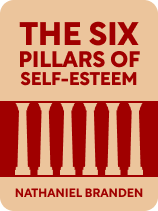

This article is an excerpt from the Shortform book guide to "The Six Pillars of Self-Esteem" by Nathaniel Branden. Shortform has the world's best summaries and analyses of books you should be reading.
Like this article? Sign up for a free trial here .
Do you lack a sense of control over your life? Do you feel your life is ruled by circumstances as opposed to your conscious choices?
Taking control of your life starts with taking responsibility for your life and your actions rather than blaming other people or external circumstances. If you don’t take responsibility, you’ll never feel like you control your life—so you can’t feel capable or worthy. For example, if you don’t take responsibility for your finances as an adult and instead rely on your parents to fund your life, you won’t feel like you can do things they dislike—so you won’t feel capable or worthy of living according to your own desires.
Here’s how to take control of your life, according to psychotherapist Nathaniel Branden.
How to Take Control of Your Life
If you want to learn how to take control of your life, you have to take ownership of your life, behavior, and well-being. In other words, you stop the external factors for your misfortunes—you take responsibility where it’s due.
Taking self-responsibility requires that you understand:
1. You are responsible for reaching your goals. You understand that only you can develop and implement a plan to achieve your goals, and only you can ensure your schedule reflects your commitment to those goals. You also know that it’s your job to ask for any help you need. (Shortform note: To effectively schedule the tasks that support your goals, try the six-level model of prioritizing that productivity expert David Allen suggests in Getting Things Done.)
2. You are responsible for your behavior. You understand that you choose every action you take. (Shortform note: In Goals!, Brian Tracy writes that it’s important to learn that any change you want to make in your life is entirely up to you. This means that you have to free yourself from a sense of entitlement, a victim mentality, and hypersensitivity to other people’s opinions.)
3. You are responsible for how you relate to others. You don’t shift blame—if you claim to act some way because somebody else is unreasonable, you’re shirking your responsibility. You also understand that it’s your job to clearly communicate your message and to ensure that others understand it.
(Shortform note: You may struggle to take responsibility for your behavior and relationships if you’ve experienced trauma that affects either. Keep in mind the distinction that The Subtle Art of Not Giving A F*ck author Manson points out: You are not to blame for everything that happens to you, but you are responsible for how you respond to it.)
4. You are responsible for your happiness and self-esteem, which are totally in your control. You don’t depend on others—like your parents or spouse—to provide it. (Shortform note: In Designing Your Life, Silicon Valley innovators Bill Burnett and Dave Evans recommend a technique you can use to exercise greater control over how you feel about your life: Plot out several ways of living that you might enjoy, pick one, then let go of the options you didn’t choose instead of agonizing over them.)
Taking self-accountability involves facing life actively rather than passively, which manifests in the following.
1. You are productive. You understand that you must achieve independence by working. So you ask yourself: What can I do? How can I improve my current state? (Shortform note: If you struggle to improve your productivity because you dislike your job, try redefining work as any activity you do that aligns with your values, purposes, and dreams, as Joseph R. Dominguez and Vicki Robin do in Your Money or Your Life. Accepting that you may never get paid for what you truly want to do gives you both the freedom to pursue it without worrying about pay and the motivation to find a different job that funds your true interests.)
2. You think independently. You analyze others’ opinions, only repeating them if you believe and understand them. (Shortform note: While Branden primarily warns against automatically accepting others’ opinions, in How to Read a Book, educators Mortimer J. Adler and Charles Van Doren add that automatically criticizing others’ opinions is also harmful. If you criticize an author without first fully understanding them, you’re not having a conversation that can lead to learning, because you’re not actually criticizing the author’s argument.)
3. You look for solutions instead of waiting for instructions. (Shortform note: To find an effective solution to any problem, The Oz Principle authors recommend pinpointing the root of the issue so you’re not wasting your time on superficial aspects.)

———End of Preview———
Like what you just read? Read the rest of the world's best book summary and analysis of Nathaniel Branden's "The Six Pillars of Self-Esteem" at Shortform .
Here's what you'll find in our full The Six Pillars of Self-Esteem summary :
- Exactly how to behave to improve your self-esteem
- Why you need to take responsibility for your life and actions
- Why so many self-esteem techniques don't work






